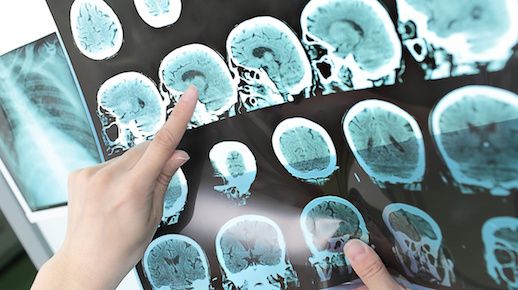Article
Could "No Evidence of Disease" in MS become "Disease Free"?
Author(s):
Biomarkers could provide a disease-free multiple sclerosis status.

A new proposal from French neurologists suggests adding biomarkers in cerebrospinal fluid (CSF) to the current parameters of no evidence of disease activity (NEDA) for multiple sclerosis (MS) could provide a "disease-free" status score.
"NEDA is pragmatic but insufficient for assessing disease-free status," declared Mickael Bonnan, MD, and colleagues of the neurology service, Hôpital F. Mitterand, Pau, France.
"We propose adding to the NEDA, the criterion: no evidence of biological activity in CSF. This composite criterion should address neurodegenerative biomarkers (sampling neuronal and glial markers) and immune activation biomarkers (sampling B cells, T cells and macrophages/microglia)", they said.
Bonnan and team noted that current treatments have succeeded in sustaining clinical remissions, marked by NEDA criteria of the absence of relapse, absence of confirmed disability progression, and absence of gadolinium-enhancing T1 lesions or new/enlargement of T2 lesions on MRI. They also pointed out that NEDA parameters have recently contained an absence of brain atrophy, albeit with some concern about reliability of its measure.
According to Bonnan, these NEDA criteria would be sufficient if the goal of treatment remains the sustaining of apparent remission in the relapsing-remitting phase of MS. The criteria are not enought; however, to detect whether there is a concurrent suboptimal response to treatment, which they characterize as a "persistent slow-burning neurodegenerative process."
The NEDA criteria are also not able to mark a greater therapeutic response that could be achieved with more effective treatments in the future. Bonnan and colleagues expect that level of response to correspond to normalization of biological inflammatory parameters, which can be most readily measured in the CSF, or possibly with corresponding serum neurofilament levels to avoid the need for spinal tap.
They acknowledged the need for additional study to correlate such neurodegenerative biomarkers with brain atrophy. While they found preliminary evidence of neurofilament levels correlating with brain tissue loss at one year in clinically isolated syndrome (CIC) of MS, there’s no evidence yet on the progressive phase.
They also recognize the question of timeline in establishing the relation of measured biomarkers to axonal neurodegeneration. Biomarker levels taken following an attack would mainly reflect the size and severity of the inflammatory lesion, so the measure after controlling the relapsing-remitting phase could provide better correlation with long-term prognosis.
"Biomarkers in CSF and/or serum might help in assessing the persistence of inflammatory and neurodegenerative processes long before CNS atrophy occurs," Bonnan and colleagues indicate. "Longitudinal studies are required to validate the putative although probable connection between CSF biomarkers and long-term impairment in MS."
The proposal for adding CSF biology to NEDA criteria in MS, “No Evidence of Disease Activity (NEDA) in MS Should Include CSF Biology--Towards a 'Disease-Free Status Score',” was published in the January issue of Multiple Sclerosis and Related Disorders.
Related Coverage:
Identifying Neuroimaging Biomarkers for MS
Brain Atrophy in Multiple Sclerosis: Leaky Red Blood Cells to Blame?





